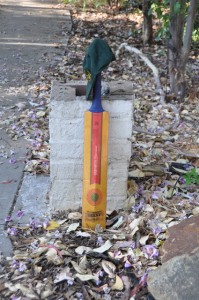Cricket bats and caps signal national grief
Never have cricket bats been such a poignant symbol of culture. Neighbours were among countless Adelaideans who placed cricket bats and caps on their properties as a sign of respect – and sadness – for the untimely and tragic death of Redbacks cricket star Phillip Hughes. The nation’s overwhelming outpouring of grief when Phillip died following a freak bouncer delivery by Sean Abbott, has become an amazing cultural phenomenon. Some say the media has given us an overdose of coverage and expressed sympathy for Phillip’s parents for such an onslaught about the death of their beloved son. However, on the day of his funeral, I snapped this cricket bat propped up against the letter box on my neighbours, three houses down in my street in the Adelaide Hills. Driving to the hairdresser down on the plains, I passed a few others in leafy suburban streets. Ordinary Australians far away from Macksville, wanted to show respect for Phillip as one of the young cricket stars of our nation. We didn’t have to visit anywhere. We could make a poignant gesture in our own front yards.
However, it is the television coverage of Phillip’s funeral which so united us. It was so sad that anyone watching would have been moved to tears. We all needed to feel part of his farewell and every parent ached inside for Phillip’s mother weeping in the front pew of her son’s funeral, but especially, Phillip’s big, burly dad, weeping as he carried his son’s casket from the Catholic church. Ironically, his dad helped make it OK for men to cry because he wept with great sadness in such a public place, which validates the fact that men need to be able to let grief manifest in tears. It is such a human response to profound human sadness and unspeakable loss. This is why it’s OK for men to weep because it is part of our quiver-full of human emotions we are born with. Along with love comes loss.
Losing such a popular player at age 25 was certainly “unchartered waters” for our cricketing community and fans, but Australian captain Michael Clarke showed much-needed leadership which really was the stuff of 21st century Aussie sporting heroism, far more important at that moment than hitting a ball for 6 to clock up a century. As former Australian cricket team captain, Rick Ponting stated in today’s The Weekend Australian, in a time of adversity, Clarke’s character and integrity shone through.
I believe why we were all engaged so completely with the tragedy was because, whether we are cricket fans or not, we are Australian and and we understood that Phillip was a country boy from a small regional town where many of us also have roots, even if a generation back in time. We agreed with his parents who declined a big funeral in a capital city and decided their boy would have a Catholic funeral in the same Catholic church where he was baptised, the same faith background of many millions of Catholic Australians. The spiritual environment of the country priest officiating and the informality of a Prime Minister sitting in row three seemed to resonate with who we are now as Australians – still an informal lot, mostly Christian and Catholic with a Prime Minister, who is a practicing Catholic. The eulogies by Phillip’s siblings captured a wonderful young country fellow who had one foot back in Macksville with his cattle and the other at the pitch batting for South Australia when he achieved 63 not out against rival state NSW. And where in the world would it have seemed so natural for everyone, from politicians, international and local cricketers and town dignitaries to follow the hearse with family and relatives walking down the main street of such a typical rural town – Macksville – now forever famous as the final resting place of Australian cricket star, Phillip Hughes. That is my humble opinion on why we were all so moved by the whole process of Phillip’s death. The media should be congratulated, not criticised for excellent coverage of what was a defining cultural moment in many ways.
RSS feed for comments on this post. TrackBack URI




